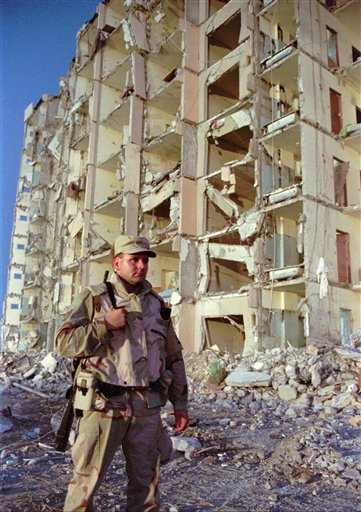Who would have thought that the head of the terrorist cell that carried out the 1996 Alkhobar bombing in Saudi Arabia would be arrested after being on the run for 19 years?
Arresting Ahmed Al-Mughassil in Beirut and handing him over to the Saudi authorities in Riyadh has turned the page on one of the most important and dangerous security and political cases. This is because the operation was plotted in Iran, the victims were from the US and the crime was committed on Saudi territories. This case also involved other countries such as Canada, Syria and Lebanon because of the presence of the suspects on their territories.
It is said that the violent attack in the summer of 1996 was so big that the explosion was heard from Bahrain. The force of the bomb caused a10-meter crater in the ground and destroyed one side of the Khobar towers. Nineteen US troops were killed and about 500 others were injured. Perhaps it would have ranked the worst terrorist operation in the world, in terms of injuries, if the perpetrators did not put the bomb in a water truck, which reduced the force of the explosion.
The bombing may have also been followed by a series of explosions planned by the Iranians in Saudi Arabia in 1996, had a customs agent not stopped a truck crossing the border from Jordan to Saudi Arabia, because he suspected it being too low on the ground, indicating it contained something heavy. When inspected, they discovered huge quantities of explosives, thwarting other planned operations.

Those who were engaged in the terrorist operations, whether Saudi or not, were merely guns hired by Iran for political purposes. Iran would eventually get rid of them at a later stage. Syrian authorities got rid of another wanted Saudi man in the terrorist cell, after Saudi security services discovered his whereabouts, two months after the bombing. When Saudi authorities asked the Syrian authorities to hand him over, they denied his presence at first and later claimed that he committed suicide in prison by eating soap. Well, nobody believed that story. Later on, Syrian authorities handed over another wanted Saudi man who was in hiding there and a third was later handed over in Lebanon.
When it comes to terrorist crimes, there are files that can neither be closed with the passage of time nor through political reconciliation. The perpetrators will be pursued no matter how far they get or what regime is protecting them. The regimes that hired them to kill, will sell them at the appropriate time later on.
It is Iran that has expanded the concept of modern state terrorism since the early 1980s. It used it as a key tool in its foreign policy to blackmail and threaten forces and various governments in the region and beyond. The assassinations of significant figures in Lebanon after 2005 were part of a Syrian-Iranian policy to increase Iran’s influence in Lebanon and the region. It initiated its plan by kidnapping westerners in Lebanon in the 1980s. During the decade that followed, Iran was behind the bombings in France and South America. When we put Iran’s numerous attacks within the framework of its stated policies, we wonder if it has now reached its goals.
But in fact, Iran has not succeeded in achieving anything important, as it was not able to change regimes, or even influence them and force them to alter their policies. This is with the exception of Lebanon, which has always been an easy ground for Iranian activities, and of course, Tehran’s ally — the Syrian regime. Violence has failed to achieve any significant accomplishment for Iran. Its policy has resulted in the presence of the US and other western forces on Gulf waters, while they wanted them out of the region. This is what led to an increase in Iran’s isolation and misery.
Abdulrahman al-Rashed is the former General Manager of Al Arabiya News Channel. A veteran and internationally acclaimed journalist, he is also a former editor-in-chief of the London-based Arab daily Asharq al-Awsat.
Arab News


Leave a Reply
You must be logged in to post a comment.